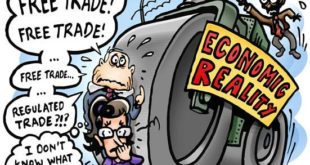Iran — eine religiöse überlackierte Kleptokratie .[embedded content]
Read More »Honour the brave
.[embedded content] To my freedom fighting brothers and sisters in Ukraine. Never give in. Never give up. [embedded content]
Read More »On the validity of econometric inferences
On the validity of econometric inferences The impossibility of proper specification is true generally in regression analyses across the social sciences, whether we are looking at the factors affecting occupational status, voting behavior, etc. The problem is that as implied by the three conditions for regression analyses to yield accurate, unbiased estimates, you need to investigate a phenomenon that has underlying mathematical regularities – and, moreover,...
Read More »Lemon Day
.[embedded content] I dessa tider, när ljudrummet dränks i den kommersiella radions tyckmyckentrutade ordbajseri och fullständigt intetsägande skvalmusik, har man ju nästan gett upp. Men det finns ljus i mörkret! Nils Frahms musik är en meditativ örontvätt som rensar hörselgångarna från kvarvarande musikslagg. Att få lyssna till sådan musik ger sinnet ro och får hoppet att återvända. En lisa för själen.
Read More »BTO
.[embedded content]
Read More »The economist’s oath
. — I will remember that I didn’t make the world, and it doesn’t satisfy my equations. — Though I will use models boldly to estimate value, I will not be overly impressed by mathematics. — I will never sacrifice reality for elegance without explaining why I have done so. — Nor will I give the people who use my model false comfort about its accuracy. Instead, I will make explicit its assumptions and oversights. — I understand that my work may have enormous effects on society...
Read More »Mainstream economics — a form of brain damage
Mainstream economics — a form of brain damage .[embedded content]It is difficult to understand why mainstream economists keep on using their unreal and irrelevant models! Sure, you get academic accolades and give the impression of having something deep and ‘scientific’ to say, but that should count for nothing if you’re in the truth business. As long as that kind of modelling output doesn’t come with the accompanying warning text “NB! This is model-based...
Read More »Svenska kulturgiganter i mitt bibliotek
Svenska kulturgiganter i mitt bibliotek .
Read More »Tory trickle-down mumbo jumbo
Tory trickle-down mumbo jumbo .[embedded content] Absolutely gobsmacking … This MP certainly experiences bad luck trying to think …
Read More »Free trade delusions
We must ask why economists still ignore the obvious reality that application of their standard free trade model failed to generate broad-based income gains. Why do many still turn a blind eye to the mounting evidence of the social, economic, and human costs of the globalization experiment? Some were genuinely misled by the fancy algebra. But many know their models are irrelevant. They were seduced by the surprising willingness of political leaders to believe their sophistries...
Read More » Lars P. Syll
Lars P. Syll




